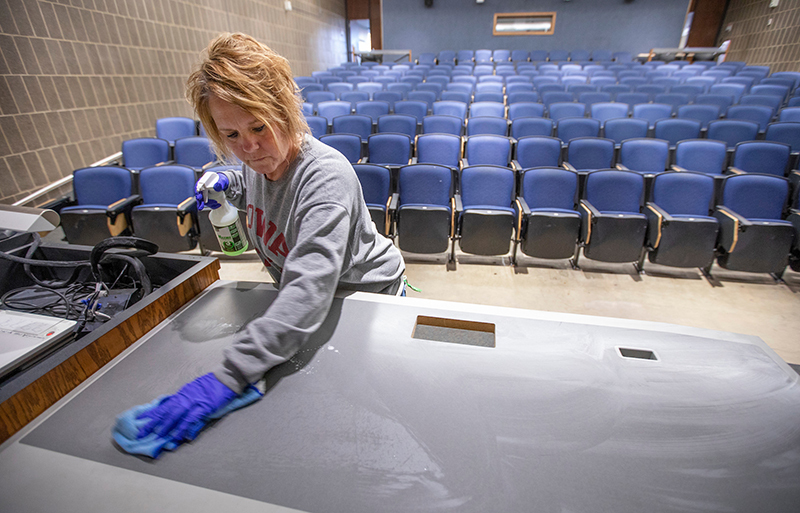Clean workspaces are a team effort in a pandemic
Author: Anne Krapfl
This is an archived story. The content, links and information may have changed since the publication date.
Author: Anne Krapfl

Custodian Carol Ann Musser disinfects the teaching table in a Carver Hall auditorium Tuesday as part of deep cleaning efforts during spring break week. Photo by Christopher Gannon.
The depletion of disinfectants and sanitizers on store shelves suggests central Iowans are well-armed to stave off the novel coronavirus in their homes. Are they as attentive to their workplaces?
Fewer students on campus spring break week has freed up some hours for facilities planning and management's (FPM) 10 custodial teams to tackle strategic cleaning assignments in classrooms, lounges and other common spaces. Tuesday morning found a team in Carver Hall cleaning and disinfecting "all the places people touch," according to custodian Carol Ann Musser: doors, doorknobs, lecterns, chair arms, desks, bathroom fixtures.
The teams have their assignments, and other employees shouldn't be giving them cleaning instructions. FPM director of facility services Bob Currie said requests for additional services are assessed on a case-by-case basis according to a team's workload. Call 294-5100 to request more frequent or extra services. Concerns about potentially contaminated spaces due to the coronavirus outbreak should be shared with the workforce protection working group, one of about a dozen activated under the university's coronavirus emergency operations plan. Director of environmental health and safety Paul Richmond, 294-9698, leads that team. Concerns about possible COVID-19 symptoms in a university employee should be shared with the health services working group, whose members can help with screening questions to determine appropriate actions. Thielen Student Health Center director Erin Baldwin, 294-5802, leads that team.
Richmond advised employees to be vigilant about their own work areas.
"We're working through a highly unusual time for our university, and we know our custodial teams are fulfilling their daily and weekly tasks with that in mind," Richmond said. "The workforce protection group encourages employees to be proactive, for example to wipe down their own work stations more frequently or attend to their own break rooms, as needed.
"There's nothing inappropriate about a cooperative approach to cleaning during a pandemic," he said.
FPM's 130-plus custodians, who clean most academic and administrative buildings -- more than 7 million square feet -- are following their normal procedures using their normal products, said custodial services manager Michelle Lenkaitis. ISU cleaning standards are guided by APPA, the national association for educational facilities. During every winter flu season the FPM teams are asked to be extra thorough in sanitizing light switches, hand railings and door handles. And in the last few weeks, Lenkaitis said she has encouraged them to sanitize sinks and surfaces in restrooms again before their shift ends -- for everyone's benefit.
"They're feeling especially vulnerable right now since they're working in public spaces all the time. They're on the front line," Lenkaitis said.
When normal university operations return, Lenkaitis said custodians will resume their usual daily and weekly services. The key pieces of that routine are:
Specialty areas -- such as food preparation, research, diagnostics, health care and child care -- use specific cleaning procedures. For example, ISU Dining complies with all regulations enforced by the Iowa Department of Inspections and Appeals' Food and Consumer Safety Bureau. Dining staff also are cleaning high-touch surfaces more frequently.
Since Tuesday and through March 31, ISU Dining locations are restricted, by gubernatorial proclamation, to carry-out service.
Transportation services has adopted new cleaning protocols for fleet vehicles, said director Kathy Wellik. All vehicles were deep cleaned and disinfected last week. Staff members are cleaning returned vehicles with disinfectant spray and wipes, in addition to the regular vacuuming and spot cleaning. At the time they pick up a vehicle, customers will have access to disinfectant wipes to repeat the process if they wish.
Multiple times each day, staff members also disinfect all surfaces in the vehicle kiosk room, such as door handles, key cabinet, keyboard and the kiosk.